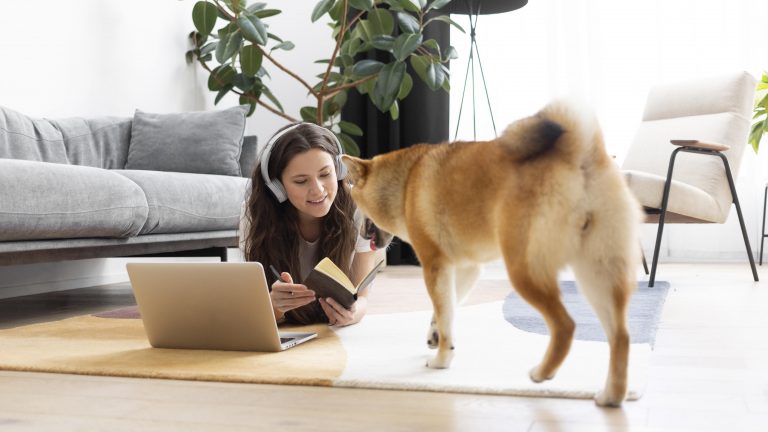Talking to Your Dog Every Day: 7 Unexpected Benefits That Strengthen Your Bond
Everyone knows that dogs are man’s best friend, but did you know that talking to your dog daily can immensely strengthen your bond? Engaging in regular conversations with your dog can seem trivial, yet it sparks profound emotional and psychological growth, not just in dogs, but their human companions too. It turns out, these daily interactions create a deeper sense of connection and trust.
The practice of talking to dogs dates back thousands of years, almost as old as domestication itself. Studies have shown that although dogs might not understand every word, they respond to the tone and consistency of their owner’s voice. This consistent vocal engagement can reduce stress and anxiety for both parties, making conversations an essential part of pet ownership. Statistics reveal that dog owners who regularly communicate with their pets often experience a lower rate of heart disease, illustrating a mutually beneficial relationship.
Talking to your dog every day enhances their understanding of language, builds a stronger emotional connection, increases trust and loyalty, improves social skills, reduces anxiety and stress, aids in faster training, and promotes positive behavioral health. These daily interactions create a more harmonious and trusting relationship between you and your pet.

Talking to Your Dog Every Day: 7 Unexpected Benefits That Strengthen Your Bond
Talking to your dog daily can greatly improve their understanding of language. While dogs might not grasp every word, they learn to pick up on tone, inflection, and context. This helps them better comprehend your commands and emotions. Over time, your pup becomes more attuned to your moods and responses. This makes training and interaction more seamless.
Another benefit is the stronger emotional connection formed through daily chats. Dogs thrive on attention and feel more secure when they hear your voice regularly. This consistent interaction fosters trust and loyalty. These deeper bonds lead to a happier and more well-behaved pet. It also ensures you have a faithful companion at all times.
Talking to your dog every day also improves their social skills. By hearing your voice regularly, dogs learn to be more comfortable in social situations. It encourages them to be less anxious around other people and animals. This is especially helpful during walks and vet visits.
Daily communication with your dog can significantly reduce stress and anxiety for both of you. The act of speaking to your dog provides comfort and a sense of security. It also helps to create a relaxing environment after a long day. For dogs, this can mean less destructive behavior. Mutual well-being is nurtured through regular conversation.
My Secret For Handling Grief 💔
1. Enhances Dog’s Understanding of Language
Daily conversations with your dog play a vital role in enhancing their understanding of language. While dogs may not comprehend every word, they quickly learn to interpret tone and context. They associate specific sounds and phrases with actions, which helps in clear communication. This is especially useful during training. Commands become easier for them to follow.
Your dog’s vocabulary can expand through regular interaction. The more words they hear, the more they can associate certain sounds with specific meanings. This helps them to better understand everyday commands and requests. Over time, they can even pick up on new commands more quickly. This leads to enhanced obedience and responsiveness.
Engaged listening isn’t just beneficial for language, it also improves your dog’s cognitive development. Regularly hearing new words and phrases stimulates their brain. This kind of mental stimulation keeps them sharp and alert. It also contributes to their overall well-being by reducing boredom. A mentally stimulated dog is typically happier and healthier.
Additionally, using varied language introduces them to different contexts and situations. By talking to your dog while performing various activities, they begin to understand the sequence of events. For instance, using phrases like “time for a walk” or “let’s eat” helps them anticipate what comes next. This awareness makes their daily routine smoother and more predictable.
2. Builds Stronger Emotional Connection
Talking to your dog every day can significantly strengthen your emotional connection. Consistent communication helps your dog feel more secure and loved. They learn to associate your voice with comfort and affection. This bond creates a sense of safety for your dog. It also makes them more likely to respond positively to your presence.
Daily conversations foster mutual understanding between you and your dog. When you talk to them often, they become more attuned to your emotions. They can sense when you are happy, sad, or stressed and react accordingly. This understanding makes your relationship deeper. It also enhances your ability to communicate non-verbally.
The trust built through regular interaction is invaluable. Your dog starts to rely on you for emotional support. They become more confident in their environment knowing you are around. This trust also impacts their behavior in a positive way. A confident and comfortable dog is less likely to display anxious or destructive behaviors.
Sharing your thoughts and feelings with your dog can also improve your own emotional health. Talking to your pet can be a therapeutic release, reducing stress and loneliness. This mutual benefit creates a happier home environment. Plus, the joy and companionship your dog provides make every conversation worthwhile. The emotional bond you share can improve the quality of life for both of you.
3. Increases Your Dog’s Trust and Loyalty
Regular communication with your dog is key to building trust. When you talk to them consistently, they learn to depend on your voice as a source of comfort. This sense of reliance fosters a deeper level of trust. Trust is the cornerstone of loyalty. A dog that trusts you is more likely to stay by your side.
Talking to your dog daily also makes them feel included. When you engage in conversations with your pet, they feel like a valued member of the family. This inclusion strengthens their loyalty. Dogs who feel part of the pack are less likely to roam or exhibit disobedience. Their primary focus remains with their trusted human.
Consistency in communication is crucial for strengthening loyalty. Dogs thrive on routine and familiarity. When they hear your voice daily, it becomes a stable part of their life. This predictability translates to increased loyalty. Your dog recognizes your commitment and reciprocates with unwavering devotion.
Moreover, regular conversations help in decoding your dog’s body language. Understanding their signals builds mutual trust. When your dog realizes you can interpret their needs, it strengthens their bond with you. This mutual understanding fosters loyalty. They become more eager to please and cooperate.
Communication during training sessions reinforces loyalty as well. Verbal praise and positive reinforcement build a trusting relationship. Your dog learns that listening to you results in rewards. This positive association enhances their willingness to obey. It cements their loyalty further.
Daily interactions also reduce misunderstandings. Clear communication lowers the chances of misinterpreting each other’s actions. This clarity helps prevent behavioral issues born out of confusion. In turn, trust remains intact. A dog that understands what’s expected remains loyal and content.
4. Improves Dog’s Social Skills
Talking to your dog daily can greatly improve their social skills. Regular communication helps your dog become more comfortable with human interactions. They start to associate speaking with positive experiences. This makes them more approachable and less anxious around new people. It also aids in building their confidence.
Verbal interactions also prepare your dog for social settings. They learn to respond to different vocal cues which is helpful in busy or crowded environments. Consistent talking familiarizes them with human speech patterns. This reduces their stress during social outings. It ensures they remain calm and well-behaved.
Your dog’s ability to learn social cues is enhanced through daily conversations. They pick up on your tone and body language. Understanding these cues is crucial for interacting with other dogs and people. It teaches them to read situations better. This leads to more positive social encounters.
Training sessions that include verbal commands can improve social integration. When dogs understand commands like “sit” or “stay,” it makes them easier to handle in public. It’s beneficial during visits to parks or pet-friendly places. Well-trained dogs are usually more welcomed by other pet owners. This promotes a healthy social life for your pet.
Regular dialogue also helps in reducing unwanted behaviors during social interactions. Dogs that are spoken to regularly tend to bark less. They are more likely to remain calm and composed. This makes them more pleasant to be around. It enhances their reputation as well-behaved pets.
Improved social skills make activities like vet visits less stressful. When your dog is used to hearing and responding to your voice, they are more relaxed in unfamiliar situations. This ease translates into better behavior around unfamiliar animals and humans. Their improved social skills contribute to a more harmonious life.
5. Reduces Anxiety and Stress for Both
Speaking to your dog daily can significantly lower anxiety and stress levels, for both of you. For dogs, hearing a familiar and comforting voice can alleviate feelings of loneliness or fear. This consistent interaction provides a sense of security. Your voice becomes a source of reassurance. It helps them remain calm during stressful situations.
For pet owners, talking to their dog can serve as a stress-relief mechanism. Sharing your thoughts and feelings with your dog can reduce feelings of isolation. It offers an emotional outlet. This helps in calming your mind. Many people find it therapeutic to have a non-judgmental listener.
Daily communication can also help in recognizing stress signals early. When you regularly engage with your dog, you become more attuned to their behaviors. You can quickly notice any signs of anxiety or discomfort. This early detection allows for timely interventions. It helps in managing stress effectively.
Engaging in conversation can also make routine activities less stressful. For example, talking to your dog during car rides or vet visits can keep them distracted. They are likely to focus on your voice rather than the stressful elements around them. This creates a more relaxed experience. It reduces any associated anxiety.
Additionally, consistent verbal interaction sets a positive tone in the household. It creates a lively and engaging environment. This positively impacts the overall mood of both the dog and the owner. A stress-free home means a happy pet and a happy pet owner. Both benefit from a harmonious living space.
Regular talking can also prevent stress-related behaviors in dogs. These can include destructive chewing or excessive barking. When dogs feel secure and understood, they are less likely to act out. This results in a more peaceful coexistence. The mutual reduction in stress enhances the quality of life for both.
6. Aids in Faster Training
Daily conversations with your dog can significantly speed up the training process. Talking to your dog regularly helps them become familiar with your voice and commands. This familiarity makes it easier for them to understand and follow instructions. Consistent verbal interaction ensures they quickly grasp what is expected of them.
Verbal cues used during training sessions are more effective when reinforced through daily communication. When dogs hear commands consistently, they start associating specific words with actions. This repetition solidifies their understanding of those commands. It leads to quicker responses and better obedience. Repetition is key in dog training.
Your tone of voice plays a crucial role in training efficiency as well. Dogs learn to distinguish between different tones, such as praise or correction. Using varied tones during daily talks helps you communicate more effectively during training sessions. Your dog will know when they’ve done something right or need improvement.
Building a vocabulary base is another way that talking aids in faster training. As you use more words around them, dogs begin recognizing new phrases related to training activities. This expanded vocabulary allows for more complex interactions during training exercises. They can follow multi-step instructions once they master basic commands.
- Sit
- Stay
- Come
- Heel
- Down
Talking to your dog also helps keep their attention focused on you during training sessions. Dogs that are used to hearing their owner’s voice are less likely to be distracted by external factors. This focused attention ensures they stay engaged and responsive throughout the session, resulting in faster learning.
Moreover, regular verbal engagement makes correction smoother and less stressful for both parties involved in training exercises—whether it’s about house rules or outside etiquette practices like leash manners—and instills good behavior patterns effortlessly over time while ensuring prompt compliance consistently across various scenarios encountered ahead!
7. Promotes Positive Behavioral Health
Talking to your dog every day can significantly promote positive behavioral health. Regular communication satisfies their need for interaction, reducing feelings of loneliness and boredom. As a result, they are less likely to develop destructive behaviors such as chewing or digging. Engaging them mentally keeps them occupied. It nurtures a more balanced temperament.
Verbal interaction also helps in addressing behavioral issues early on. By talking to your dog, you can reinforce good behavior and correct undesirable actions immediately. Using positive reinforcement and gentle corrections during these conversations promotes a well-behaved pet. Consistency is key to solidifying these positive behavior patterns. It ensures long-term compliance and good habits.
Dogs respond well to routine and structure, which can be achieved through daily communication. By establishing a consistent dialogue, dogs understand what is expected of them in different situations. This clarity helps reduce confusion and anxiety. Dogs with a clear understanding of household rules are generally happier and more relaxed. It contributes to their overall behavioral health.
Daily chats can also make your dog more adaptable to changes in their environment. Regular interaction helps them become more resilient to disruptions in their routine. They are more likely to remain calm and composed when faced with new situations or stimuli. This adaptability is crucial for their behavioral health. It ensures they can cope well with life’s various challenges.
| Behavioral Benefits | Impact on Health |
|---|---|
| Reduced Anxiety | Less destructive actions |
| Consistent Good Habits | Enhanced obedience |
| Improved Adaptability | Stress management |
| Balanced Temperament | Overall well-being |
Overall, integrating daily conversation into your dog’s life promotes a happier, healthier pet. Continuous engagement fosters a trusting and affectionate relationship. It aligns their behavioral health with their emotional needs. The simple act of talking to your dog can transform their well-being. It’s a small effort with substantial rewards.
How Everyday Conversations Benefit Dog Development
Engaging in everyday conversations with your dog significantly boosts their cognitive development. Regular talk helps in stimulating their brain, keeping them mentally active. This mental stimulation is vital for their overall growth and well-being. Active minds are less prone to boredom and related behavioral problems. Your dog becomes more alert and responsive.
Language development is another critical aspect benefitted by constant verbal interaction. While dogs may not understand every word, they begin to associate sounds with actions and emotions. This understanding helps in improving communication between you and your pet. They learn quicker and respond better to commands. Enhanced language skills lead to more effective training sessions.
Daily conversations also help in developing your dog’s emotional intelligence. By constantly interacting with them, dogs become more attuned to your feelings and reactions. This emotional awareness helps create a deeper bond between you and your pet. They become more empathetic and can provide comfort in times of need. This mutual emotional support enriches their development.
Social skills are also sharpened through regular verbal interactions. Dogs that hear and respond to human speech frequently become more sociable. They find it easier to interact with other dogs and people. This social comfort reduces stress and anxiety in new or crowded environments. Well-socialized dogs are generally happier and more confident.
| Developmental Benefits | Impact |
|---|---|
| Cognitive Stimulation | Enhanced mental alertness |
| Language Skills | Better command response |
| Emotional Intelligence | Deeper bonds |
| Social Skills | Increased sociability |
Furthermore, everyday conversations can help in recognizing and addressing any developmental issues early. You become more familiar with your dog’s typical behavior. This familiarity allows you to identify any deviations quickly. Early intervention ensures your dog stays on a healthy developmental path. Regular communication is a simple yet effective tool for your dog’s growth.
Overall, incorporating everyday conversations into your dog’s life provides numerous developmental benefits. From enhancing cognitive abilities to improving social skills, the impact is profound. Talking to your dog helps them grow into well-rounded, emotionally balanced pets. It’s a practice that rewards both the pet and the owner.
The Psychological Impact of Regular Communication on Pets
Regular communication with your pets has a profound psychological impact on them. Dogs and cats, in particular, thrive on daily interactions. These interactions provide constant mental stimulation. This mental engagement is crucial for their psychological well-being. Engaged pets are generally happier and more content.
Talking to your pet establishes a sense of security. Hearing your voice regularly reassures them that you are present. This presence helps reduce feelings of loneliness and separation anxiety. Pets who feel secure are less likely to exhibit destructive behaviors. A secure environment leads to better psychological health.
Daily communication also strengthens the emotional bond between you and your pet. When you converse with them, they start understanding your moods and feelings. They learn to provide comfort when you are stressed. This mutual emotional support creates a stronger, more empathetic relationship. A strong bond positively affects their mental state.
Consistency in communication helps in building routine and structure. Pets thrive on predictability and knowing what to expect from their day. Regular talks establish this routine, making them feel more in control. Controlled environments lower their stress levels and contribute to a stable mental state.
| Psychological Benefits | Impact on Behavior |
|---|---|
| Reduces Anxiety | Less destructive actions |
| Strengthens Bonds | Increased loyalty |
| Provides Security | Enhanced calmness |
| Mentally Stimulating | Prevents boredom |
Additionally, talking to your pet regularly encourages better social behavior. Pets accustomed to human interaction are more likely to be sociable. They respond better in social situations, whether with other pets or humans. This social ease improves their overall quality of life. Well-socialized pets are less anxious and more adaptable.
Overall, the psychological benefits of regular communication with pets are substantial. Consistent verbal interaction nurtures mental and emotional health. It reinforces positive behavior and builds strong, trusting relationships. Regular communication is a simple but effective way to enhance your pet’s psychological well-being.
Implementing Daily Communication Practices with Your Dog
Incorporating daily communication practices with your dog can be seamless and enjoyable. Start by setting aside specific times each day to talk to your pet. These moments can be during walks, feeding times, or even while relaxing. Consistency in these interactions helps establish a routine. It also makes your dog look forward to these bonding moments.
Use varied tones and words to keep the interaction engaging. Dogs respond well to changes in pitch and volume. This helps grab their attention and keeps them interested. Using different words also expands their understanding. This makes them more responsive to commands over time.
- Morning greetings
- Praise during playtime
- Calm reassurances when anxious
- Talks during grooming
- Bedtime chats
Pay attention to your dog’s body language during these conversations. This helps you understand how they are reacting to your words. Positive reactions can be reinforced with treats or petting. Negative reactions can help you adjust your approach. Understanding these cues makes communication more effective.
Incorporate commands and training into your daily talks. Use simple phrases like “sit,” “stay,” or “come” during regular interaction. This keeps training consistent and part of their daily routine. Consistent repetition of these commands aids in faster learning. Your dog becomes more obedient and well-behaved.
Utilize praise and positive reinforcement to encourage good behavior. Always celebrate your dog’s efforts, no matter how small. This builds their confidence and strengthens your bond. Positive reinforcement makes daily communication enjoyable for both of you. It turns communication into a rewarding experience.
Overall, daily communication not only enhances your bond but also ensures your dog’s well-being. Regular interaction reduces their anxiety and fosters a secure environment. It makes them more attentive and responsive. Implementing these practices creates a happier, healthier pet. It’s a simple step towards a fulfilling relationship.

Frequently Asked Questions
Engaging in daily conversations with your dog can bring numerous unexpected benefits. Here are some common questions related to this practice and its positive impacts.
1. How does talking to my dog improve its training?
Talking to your dog regularly helps them become familiar with your voice and commands. This familiarity makes it easier for them to understand and follow instructions, leading to quicker learning and obedience. Consistent verbal interaction ensures they quickly grasp what is expected.
Incorporating commands into your daily conversations reinforces training. For example, using phrases like “sit” or “stay” during interactions helps solidify these commands. Over time, your dog will respond more quickly and reliably, making the training process smoother and more effective.
2. Can talking to my dog reduce their anxiety?
Yes, regular communication with your dog can significantly reduce their anxiety. Hearing your voice provides comfort and reassurance, making them feel secure and less lonely. This reduces anxiety levels and helps prevent stress-related behaviors such as excessive barking or chewing.
Daily conversations also help to create a predictable environment for your dog. The routine of hearing your voice and engaging in interactions helps them know what to expect, which further reduces anxiety. A secure and predictable environment is key to a relaxed and happy pet.
3. Why will my dog’s social skills improve if I talk to them?
Talking to your dog regularly makes them more comfortable with human interaction. This familiarity with human speech makes it easier for them to adapt to new social situations, whether with other dogs or people. Improved social skills lead to reduced stress and better behavior in public.
Your dog learns to interpret different tones and cues from usual conversations, which helps in various social settings. This understanding makes them less anxious and more confident when meeting new people or encountering unfamiliar environments, improving their overall social interactions.
4. Does talking to my dog enhance their emotional well-being?
Absolutely, daily conversations can greatly enhance your dog’s emotional well-being. Regular interaction helps your dog feel loved and valued, strengthening your emotional bond. This emotional connection supports their mental health, making them feel secure and happy.
When you talk to your dog, they learn to understand your mood and emotional state. This mutual understanding fosters a deeper emotional relationship. The support and comfort they receive during these interactions contribute significantly to their overall emotional well-being.
5. How does talking to my dog benefit me as the owner?
Engaging in daily conversations with your dog offers benefits for you too. It serves as a stress-relief mechanism, providing comfort and reducing feelings of isolation. Talking to your pet can be therapeutic, improving your emotional well-being.
Additionally, building a strong bond with your dog through regular interaction promotes a harmonious home environment. A well-behaved, emotionally balanced pet contributes to a happier household, enhancing the quality of life for everyone involved.
According to Psychology Today, talking to your dog every day can strengthen your emotional connection and improve their attentiveness.
Will My Dog Recognize Me in Public?
Conclusion
Talking to your dog every day provides substantial benefits for both you and your pet. It enhances their understanding of language, builds a stronger emotional connection, and promotes positive behavioral health. These everyday conversations make life more enjoyable and stress-free.
Implementing regular communication practices is simple and highly rewarding. The time you invest in talking to your dog leads to a more harmonious relationship and a happier household. The mutual benefits are undeniable, making daily conversations an essential part of pet care.





